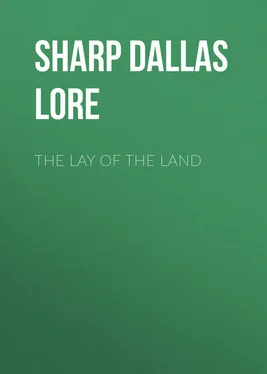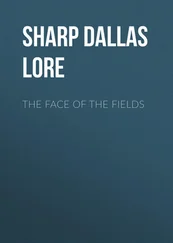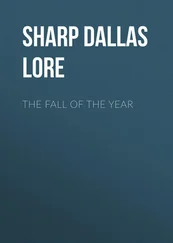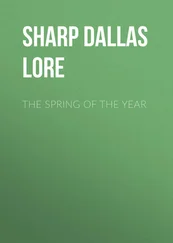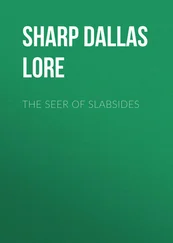Dallas Sharp - The Lay of the Land
Здесь есть возможность читать онлайн «Dallas Sharp - The Lay of the Land» — ознакомительный отрывок электронной книги совершенно бесплатно, а после прочтения отрывка купить полную версию. В некоторых случаях можно слушать аудио, скачать через торрент в формате fb2 и присутствует краткое содержание. Жанр: Природа и животные, foreign_antique, foreign_prose, на английском языке. Описание произведения, (предисловие) а так же отзывы посетителей доступны на портале библиотеки ЛибКат.
- Название:The Lay of the Land
- Автор:
- Жанр:
- Год:неизвестен
- ISBN:нет данных
- Рейтинг книги:3 / 5. Голосов: 1
-
Избранное:Добавить в избранное
- Отзывы:
-
Ваша оценка:
- 60
- 1
- 2
- 3
- 4
- 5
The Lay of the Land: краткое содержание, описание и аннотация
Предлагаем к чтению аннотацию, описание, краткое содержание или предисловие (зависит от того, что написал сам автор книги «The Lay of the Land»). Если вы не нашли необходимую информацию о книге — напишите в комментариях, мы постараемся отыскать её.
The Lay of the Land — читать онлайн ознакомительный отрывок
Ниже представлен текст книги, разбитый по страницам. Система сохранения места последней прочитанной страницы, позволяет с удобством читать онлайн бесплатно книгу «The Lay of the Land», без необходимости каждый раз заново искать на чём Вы остановились. Поставьте закладку, и сможете в любой момент перейти на страницу, на которой закончили чтение.
Интервал:
Закладка:
A single golden squash holds over almost enough of the summer to keep a long winter away from the farm; and the six of them in the attic, filling the rafter room with sunshine, never allow the hoary old monarch to show more than his face at the skylight. Pie is not the only thing one brings in with his winter squashes. He stores the ripe September in their wrinkled rinds, rinds that are ridged and bossy with the summer’s gold.
To dig one’s own potatoes! to shock one’s own corn! to pick one’s own apples! to pile one’s own squashes at one’s own barn! It is like filling one’s system with an antitoxin before going into a fever-plagued country. One is immune to winter after this, provided he stays to bake his apples in his own wood fire. One works himself into a glow with all this digging, and picking, and piling that lasts until warm weather comes again; and along with this harvest glow comes stealing over him the after-harvest peace. It is the serenity of Indian summer, the mood of the after-harvest season, upon him, – upon him and his fields and woods.
The stores are all in: the acorns have ripened and lie hidden where the squirrels will forget some of them, but where none of the forgotten will forget to grow; the winged seeds of the asters have drifted down the highways, over the hillsides and meadows; the birds are gone; the muskrats’ lodge is all but finished; the hickories and the leaf-hid hepaticas are budded against the coming spring. All is ready, all is safe, – the stores are all in. Quiet and a golden peace lie warm upon the fields. It is Indian summer.
Such a mood is a necessary condition for the cure. Such a mood is the cure, indeed, for such a mood means harmony with earth and sky, and every wind that blows. In all his physical life man is as much a part of Nature, and as subject to her inexorable laws, as the fields and the trees and the birds. I have seen a maple growing out of the pavement of a city street, but no such maple as stands yonder at the centre of my neighbor’s meadow. I lived and grew on the same street with the maple; but not as I live and grow here on the farm. Only on a farm does a man live in a normal, natural environment, only here can he comply with all the demands of Nature, can he find a cure for winter.
To Nature man is just as precious as a woodchuck or a sparrow, but not more. She cares for the woodchuck as long as he behaves like a woodchuck; so she cares for the sparrow, the oyster, the orchid, and for man. But he must behave like a natural man, must live where she intended him to live, and at the approach of winter he must neither hibernate nor migrate, for he is what the naturalists call a “winter resident.” It is not in his nature to fly away nor to go to sleep, but, like the red squirrel and the muskrat, to prepare to live up all the winter. So his original, unperverted animal instinct leads him to store.
Long ago he buried his provisions in pits and hung them up on poles. Even his vocabulary he gathered together as his word-hoard. He is still possessed of the remnant of the instinct; he will still store. Cage him in a city, give him more than he needs for winter, relieve him of all possibility of want, and yet he will store. You cannot cage an instinct nor eradicate it. It will be obeyed, if all that can be found in the way of pit and pole be a grated vault in the deep recesses of some city bank.
Cage a red squirrel and he will store in the cage; so will the white-footed mouse. Give the mouse more than he can use, put him in a cellar, where there is enough already stored for a city of mice, and he will take from your piles and make piles of his own. He must store or be unhappy and undone.
A white-footed mouse got into my cellar last winter and found it, like the cellar of the country mouse in the fable, —
Full benely stuffit, baith but and ben,
Of beirris and nuttis, peis, ry and quheit —
all of it, ready stored, so that,
Quhen ever scho list scho had aneuch to eit.
Enough to eat? Certainly; but is enough to eat all that a mouse wants? So far from being satisfied with mere meat was this particular mouse, that finding herself in the cellar in the midst of plenty, she at once began to carry my winter stores from where I had put them, and to make little heaps for herself in every dark cranny and corner of the cellar. A pint, or less, of “nuttis” – shagbarks – she tucked away in the toe of my hunting boot. The nuts had been left in a basket in the vegetable cellar; the boots stood out by the chimney in the furnace room, and there were double doors and a brick partition wall between. No matter. Here were the nuts she had not yet stored, and out yonder was the hole, smooth and deep and dark, to store them in. She found a way past the partition wall.
Every morning I shook those nuts out of my boot and sent them rattling over the cellar floor. Every night the mouse gathered them up and put them snugly back into the toe of the boot. She could not have carried more than one nut at a time, – up the tall boot-leg and down the oily, slippery inside. I should have liked to see her scurrying about the cellar, looking after her curiously difficult harvest. Apparently, they were new nuts to her every evening. Once or twice I came down to find them lying untouched. The mouse, perhaps, was away over night on other business. But the following night they were all gathered and nicely packed in the boot as before. And as before I sent them sixty ways among the barrels and boxes of the furnace room. But I did it once too often, for it dawned upon the mouse one night that these were the same old nuts that she had gathered now a dozen times; and that night they disappeared. Where? I wondered. Weeks passed, and I had entirely forgotten about the nuts, when I came upon them, the identical nuts of my boot, tiered carefully up in a corner of the deep, empty water-tank away off in the attic.
Store? The mouse had to store. She had to, not to feed her body, – there was plenty in the cellar for that, – but to satisfy her soul. A mouse’s soul, that something within a mouse which makes for more than meat, may not be a soul at all, but only a bundle of blind instincts. The human soul, that thing whose satisfaction is so often a box of chocolates and a silk petticoat, may be better and higher than the soul of a mouse, may be a different thing indeed; but originally it, too, had simple, healthful instincts; and among them, atrophied now, but not wholly gone, may still be found the desire for a life that is more than something to eat and something to put on.
To be sure, here on the farm, one may eat all of his potatoes, his corn, his beans and squashes before the long, lean winter comes to an end. But if squashes to eat were all, then he could buy squashes, bigger, fairer, fatter ones, and at less cost, no doubt, at the grocery store. He may need to eat the squash, but what he needs more, and cannot buy, is the raising of it, the harvesting of it, the fathering of it. He needs to watch it grow, to pick it, to heft it, and have his neighbor heft it; to go up occasionally to the attic and look at it. He almost hates to eat it.
A man may live in the city and buy a squash and eat it. That is all he can do with a boughten squash; for a squash that he cannot raise, he cannot store, nor take delight in outside of pie. And can a man live where his garden is a grocery? his storehouse a grocery? his bins, cribs, mows, and attics so many pasteboard boxes, bottles, and tin cans? Tinned squash in pie may taste like any squash pie; but it is no longer squash; and is a squash nothing if not pie? Oh, but he gets a lithograph squash upon the can to show him how the pulp looked as God made it. This is a sop to his higher sensibilities; it is a commercial reminder, too, that life even in the city should be more than pie, – it is also the commercial way of preserving the flavor of the canned squash, else he would not know whether he were eating squash or pumpkin or sweet potato. But then it makes little difference, all things taste the same in the city, – all taste of tin.
Читать дальшеИнтервал:
Закладка:
Похожие книги на «The Lay of the Land»
Представляем Вашему вниманию похожие книги на «The Lay of the Land» списком для выбора. Мы отобрали схожую по названию и смыслу литературу в надежде предоставить читателям больше вариантов отыскать новые, интересные, ещё непрочитанные произведения.
Обсуждение, отзывы о книге «The Lay of the Land» и просто собственные мнения читателей. Оставьте ваши комментарии, напишите, что Вы думаете о произведении, его смысле или главных героях. Укажите что конкретно понравилось, а что нет, и почему Вы так считаете.
